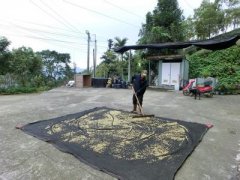A brief introduction to the cultivation of fresh-flavored Ugandan boutique coffee beans, geographical location, climate and altitude

Ugandan coffee is mainly exported to the European Union, of which Germany, Italy and other countries are the largest buyers of coffee.
Uganda is the country of origin of coffee grown in Robusta, but commercial cultivation of Arabica species here did not begin until early 1900. Today, there are still a large number of wild robusta coffee trees in Uganda, which is rare in cities in the world. As a landlocked country, the large coffee cultivation in Uganda is often interplanted, where coffee trees are mingled with food crops and rubber trees, because of the unique natural environment, the coffee here spends an average of twice a year, which makes Uganda the largest producer of coffee honey in the world.
Uganda organic Bugisu
Producing country: Uganda
Grade: HB
Planting area: Elgon region, Mbalai
Brand name: organic Bugisu
Treatment method: wet treatment
Appearance: 1.8d Compact 300grJR 16-18SCR
Variety: unknown
Later, when the ship replaced the sailboat, due to the shortened delivery time, people drank relatively fresh coffee beans. But people who are used to drinking Chen beans are not used to the fresh taste, so they desperately pursue old Java coffee, so that the Indonesian government and some businessmen deliberately store fresh beans in warehouses for one or two years and then sell them to consumers. In fact, compared with fresh beans, the acidity of aged Java beans is close to zero, but the flavor is more intense. Because of the long storage time, the increase in cost and the limited quantity, Java has always been a hot item in the coffee market. In the 1880s, 0 merchants deliberately tampered with some fresh Guatemalan or Venezuelan beans to imitate aged Java for high prices. It is intolerable that 0 merchants dye coffee beans to make them look more like old Java, but there is no doubt that the dyed chemicals are certainly toxic.
Uganda is the country of origin of coffee grown in Robusta, but commercial cultivation of Arabica species here did not begin until early 1900. Today, there are still a large number of wild robusta coffee trees in Uganda, which is rare in cities in the world. As a landlocked country, the large coffee cultivation in Uganda is often interplanted, where coffee trees mingle with food crops and rubber trees, because of the unique natural environment, the coffee here spends an average of twice a year, which makes Uganda the largest producer of coffee honey in the world.
This coffee is produced in the Mount Elgonne region of Uganda. Balanced acidity and rich oil between 1600 and 1900 meters above sea level are the characteristics of this coffee. It tastes mild and simple, with a papaya flavor.
Dry aroma (1-5): 3.2
Wet aroma (1-5): 3.4
Acidity (brightness) (1-10): 8
Taste (layered) (1-10): 8.5
Taste (alcohol thickness) (1-5): 4
Aftertaste (residue) (1-10): 8.1
Balance (1-5): 0
Basic score (50): 50
Total score (maximum 100): 85.2
Strength / main properties: medium strength / high oil content, simple and mild
Recommended baking degree: full city or full city+
Contrast: a unique African coffee, very similar to Indonesian coffee
Most of Uganda is located in the Central African Plateau, with many lakes, with an average elevation of 1,000,000m above sea level. There are many lakes and plateaus in the mountains, which are known as "plateau water villages". The western branch of the East African Rift Valley runs through the western border, with many rivers and lakes at the bottom of the valley. Uganda has a great Victoria lake, coupled with the high mountains, which makes Uganda a mild climate suitable for growing coffee, although it spans both sides of the equator.
Uganda is the birthplace of Robusta in Africa, just as Ethiopia is the birthplace of Arabica coffee, which was first found in Uganda. So far, Uganda has a history of growing coffee for more than 100 years. The output ranks second in Africa, after Ethiopia. At the same time, Uganda is one of the few major countries in Africa dedicated to the production of organic coffee.
Uganda's best coffee is produced mainly in the mountains of Elgon and Bugisu along the Kenyan border in the north-east and Ruwensori in the west.
The cultivation of coffee in Uganda is all small-scale family operation. The livelihood of 25% of the population is closely related to coffee production. About 500000 farms grow coffee, but mainly Robster. Robusta accounts for 90% of coffee production, and the remaining 1 is Arabica coffee. Arabica and Robusta are harvested from October to February.
Important Notice :
前街咖啡 FrontStreet Coffee has moved to new addredd:
FrontStreet Coffee Address: 315,Donghua East Road,GuangZhou
Tel:020 38364473
- Prev

A brief introduction to the Market Price of Ugandan Fine Coffee Bean varieties with fragrant taste
Uganda Organic Bugisu producing country: Uganda Grade: HB growing area: Elgon, Mbalai Brand: organic Bugisu treatment method: wet treatment appearance: 1.8dBash 300grgrgrere 16-18SCR Variety: unknown later when steamships replaced sailboats, people drank relatively fresh coffee beans due to shorter shipping time. But people who are used to drinking Chen Dou are not used to it.
- Next

A brief introduction to the treatment method of grinding degree and baking degree of plain and mild Ugandan boutique coffee beans
Uganda is the birthplace of Robusta in Africa, just as Ethiopia is the birthplace of Arabica coffee, which was first found in Uganda. So far, Uganda has a history of growing coffee for more than 100 years. The output ranks second in Africa, after Ethiopia. At the same time, Uganda is one of the few major countries in Africa dedicated to the production of organic coffee. Wu
Related
- Detailed explanation of Jadeite planting Land in Panamanian Jadeite Manor introduction to the grading system of Jadeite competitive bidding, Red bid, Green bid and Rose Summer
- Story of Coffee planting in Brenka region of Costa Rica Stonehenge Manor anaerobic heavy honey treatment of flavor mouth
- What's on the barrel of Blue Mountain Coffee beans?
- Can American coffee also pull flowers? How to use hot American style to pull out a good-looking pattern?
- Can you make a cold extract with coffee beans? What is the right proportion for cold-extracted coffee formula?
- Indonesian PWN Gold Mandrine Coffee Origin Features Flavor How to Chong? Mandolin coffee is American.
- A brief introduction to the flavor characteristics of Brazilian yellow bourbon coffee beans
- What is the effect of different water quality on the flavor of cold-extracted coffee? What kind of water is best for brewing coffee?
- Why do you think of Rose Summer whenever you mention Panamanian coffee?
- Introduction to the characteristics of authentic blue mountain coffee bean producing areas? What is the CIB Coffee Authority in Jamaica?

